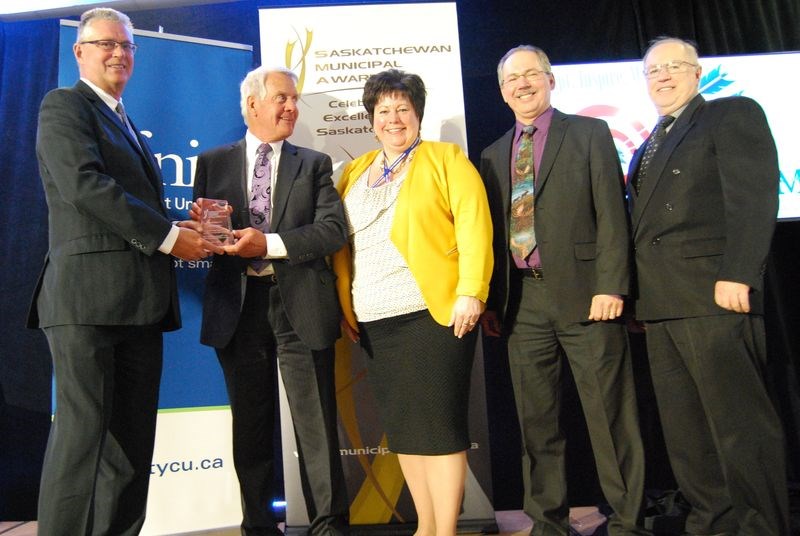Representatives of urban municipalities across Saskatchewan applauded on February 2 when Kamsack Mayor Rod Gardner accepted the first-place trophy in the ninth annual Saskatchewan Municipal Awards during the SUMA Convention in Regina.
Kevin Phillips, Melfort MLA and Legislative Secretary to the Minister of Government Relations for Regional Municipal Co-operation and Deb Button, mayor of Weyburn and president of SUMA (Saskatchewan Urban Municipalities Association), presented the award at the Queensbury Convention Centre during the 111th annual SUMA convention.
As was first announced in November, Kamsack received the award for its doctor recruitment and retention strategy and for having developed the community’s health and wellness centre.
“We received many congratulations and questions on how it was possible to raise such a large amount in such a small community,” Gardner said last week, explaining that a video had been created outlining the town’s efforts and that video was shown prior to the presentation.
Gardner said his intent is to invite those persons who appear in the video to a reception and then have it play on a loop at the clinic.
He said he thanked Affinity Credit Union, which sponsored the award, SUMA and its board.
“We are proud of that facility,” Gardner said. “I see it as a milestone for the community and area.”
The fourth such SUMA convention that Gardner has attended, he said it was one of the better ones he has attended.
“It was extremely well organized,” he said, adding that during the convention, the scheduled events were no more than three minutes out.
Gardner said he enjoyed a visit delegates made to the old Mosaic stadium where they were able to go through the Riders’ store, dressing room, therapy areas and lounge and were able to visit with representatives of the companies which dredged the Kamsack lagoon, ground the sidewalks in the community last year, is doing the tax collections, and the engineers who worked on the new fire hall.
The trade show was sold out and some of the tables had to operate from the hall, he said, adding that each time he attends, the convention becomes more and more familiar with the faces and names of fellow delegates.
Chantel Hebert, a political commentator who had been scheduled to speak at the convention last year but was unable to attend due to weather, was the guest speaker this year and talked about how mayors can be influential in a large project like a pipeline.
She was very impressive, Gardner said. She’s extremely knowledgeable and “tells it like she sees it.” She’s a good speaker and can handle a crowd.
“She encouraged us to get involved.”
Among the educational sessions Gardner attended was one dealing with health at which both Dustin Duncan, minister of health, and Greg Ottenbreit, Minister Responsible for Rural and Remote Health, had attended.
“Do you realize that 45 cents out of each dollar spent by the provincial government is spent on health?”
Gardner said it was an interesting speculation on how the future would look when all the resources that is being required by the aging baby boomers will no longer be needed.
Councillor Kozakewich, who attended a session on railway safety, said it was an excellent session in which the background behind the Lac-Mégantic rail disasterin Quebec in 2013 was explained.
Industry standards were in place but were ignored, he said. Also discussed were current risks in existing operations, particularly about rural crossroads over existing rail lines and the costs of maintaining the crossroads.
There is concern over the need for so many rural road crossings, he said.
Attending a session dealing with taking a chance on change, Kozakewich said that the presenter talked about the main causes of resistance to changes, personal impacts and culture shift anxieties.
The main message seemed to focus around allowing those most affected by change to be given time to absorb and analyze the change being implemented.
Attending a session with Jim Reiter, minister of government relations, Kozakewich said he received “many kudos” for work already done.
The convention debated and voted on 16 resolutions, Gardner said, explaining that one which council had initially said it would favour, dealing with the reduction of carbon emissions in rural Saskatchewan which called for the reduction of burning of stubble, was defeated and Kamsack’s delegates had changed their minds on the issue after having listened to the arguments.
Thirteen other resolutions were passed by a wide margin and two by a lesser amount.
Passed by a large majority were the resolutions dealing with:a request to use a sliding scale based on population when enforcing environment guidelines used to decommission existing landfills; a request to add protective services as an allowable cost for calculating off-sitelevies or development fees under The Planning and Development Act; a request to begin selecting projects for Building Canada funding andallowing work to proceed, based on a pre-approval; the calling for the expansion of the TAPD (Transit Assistance for Persons with Disabilities) program; a request to begin year-to-year funding increases for Single Integrated Library Systems (SILS) and the library system; a call for the reduction of cost barriers to property consolidations by having separate line items which identify parcel value, and a request to amend The Cemeteries Act, 1999, to have the fee for internment rights for indigent people be paid for through the Saskatchewan Assistance Program, rather than being provided freeof charge by municipalities or privateowners of cemeteries.
The call for the reduction of burning of stubble was the only resolution to be defeated and the three that were approved, but not with a large margin had to do with a request which called for “a province-wide ban on smoking and vaping in public places;” a call for stiffer penalties for failing to yield to emergency vehicles, and one which called for a request for water quality and waste management monitoring to ensure that there is a full public disclosure of information regarding water quality, quantity and waste management monitoring.




